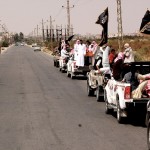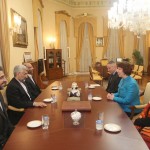via LobeLog
by Derek Davison
The resurgence of “Salafi-jihadist” terrorist groups is once again at the forefront of national security thinking in Washington. A report released this week by the RAND Corporation, “A Persistent Threat: The Evolution of al Qa’ida and Other Salafi Jihadists,” explains why.
There were 20 active “Salafi-jihadist groups” around [...]
by Jasmin Ramsey
via IPS News
Even with potential U.S. strikes against Iranian ally Syria looming, Washington and Tehran appear to be preparing for the resumption of nuclear talks.
U.S. foreign policy analysts have been bustling since the Aug. 4 inauguration of Iran’s President Hassan Rouhani, who may have ushered in a new [...]
via Lobe Log
by Farideh Farhi
From the looks of it, the second round of talks with Iran in Almaty, Kazakhstan was a complete failure, with both sides unable to even find a common language to begin a process of give and take. The sense I get is that the US side is rather [...]
Our IPS colleague Omid Memarian has a piece up at the wire explaining Iranian president Mahmoud Ahmadinejad’s sudden Monday firing of his foreign minister, Manoucher Mottaki.
Memarian’s piece draws on Iranian sources to describe the political context of, and gauge reactions to, Mottaki’s firing and his interim replacement by Ali Akbar Salehi, until now [...]
Matt Duss at Think Progress picks up on Carnegie Endowment expert Karim Sadjadpour‘s Financial Times piece yesterday to point out that military containment won’t work against as a strategy against a country — Iran — that garners regional clout through political maneuvering.
Duss also takes note of another great point from Sadjadpour: [...]
News and views on U.S.-Iran relations for November 26, 2010:
Jerusalem Post: The right-wing English language Israeli daily has a piece by columnist Michael Freund, who revives the push that U.S. President Barack Obama can save his presidency by attacking Iran. “There is one dramatic step that Obama can take that would have a transformative [...]
On Think Progress’s Wonk Room, Matt Duss reviews Carnegie associate Karim Sadjadpour’s Foreign Policy article about which historical model best fits U.S.-Iran relations. (Eli covered Sadjadpour’s piece last week.)
Duss agrees with Sadjadpour’s conclusion that the Soviet Union is the best historical model to apply to Iran, but adds something: If [...]
As mentioned in Tuesday’s Daily Talking Points, Karim Sadjadpour has written a thought provoking piece which makes the case that Iran is best characterized as a “villain inside a victim behind a veil” and should be compared to the Soviet Union to explain both its domestic and foreign policies as well as to [...]
En Español
The Latest
 From IPS News
From IPS News- By Sending Nuclear Weapons to UK, Could US be Fueling Nuclear Proliferation?
- Small Island States Fostering Effective Energy Transition To Achieve a Blue Economy
- Attacks on UNRWA Not About Its Neutrality, Says UNRWA Chief
- US Foreign Policy in Middle East Still Governed by Israeli Priorities
- Rich Nation Hypocrisy Accelerating Global Heating
- Seeking Justice for the Civilian Victims of the Syrian Civil War
- Who Should be the Next UN Leader?PART 7 FINAL
- Will a Two-State Solution include Palestine as a UN Member State?
- UN Live’s CEO Katja Iversen Talks About the Power of Popular Culture and ‘Sounds Right’
- Afghan Women’s Voices Stifled as Taliban Tightens Media Controls
- Online fundraising for IPS Inter Press Service at Razoo









